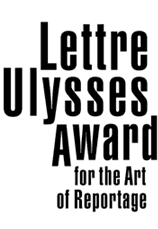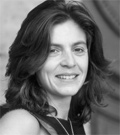
Anne Nivat, France
 “I’ve felt fear which has displaced every other feeling, but also solidarity with dozens of strangers with whom I’ve shared unique moments – moments of joy, because I could feel safe for a minute, or because I was warmed by a cup of hot tea. I tried to talk to as many people as possible: with men, women and children whose lives have been destroyed by this war, with rebels who have nothing left to lose, with Russian soldiers or officers who are caught up in this so-called “anti-terror operation” as in a trap.”
“I’ve felt fear which has displaced every other feeling, but also solidarity with dozens of strangers with whom I’ve shared unique moments – moments of joy, because I could feel safe for a minute, or because I was warmed by a cup of hot tea. I tried to talk to as many people as possible: with men, women and children whose lives have been destroyed by this war, with rebels who have nothing left to lose, with Russian soldiers or officers who are caught up in this so-called “anti-terror operation” as in a trap.”
Journalist and writer. Anne Nivat was born in France in 1969 and grew up on the Swiss border. She studied at the IEP (L'Institut d'études politiques), the institute of political sciences at the leading Sciences Po university in Paris, and completed her studies with a doctorate, specializing on Russia.
Nivat published her first book Quand les médias russes ont pris la parole: De la glasnost à la liberté d'expression, 1985-1995 (Communication et civilisation) in 1997. The work is an analysis of the Russian media landscape during the transformation of the Soviet State, which was subject to many radical changes. In 1998, Anne Nivat became a correspondent for the French daily newspaper Libération in Moscow, and since then she has also written for other international newspapers and media from Russia as a freelance reporter, including Le Soir, Ouest France, Le Nouvel Observateur and the Washington Post. She currently reports mainly for the French weekly Le Point.
In September 1999, Nivat travelled to Chechnya. Although the Russian government refused to accredit her, she reported from there undercover, disguised as a Chechen peasant, with the help of a satellite phone. Her book Chienne de guerre. Une femme reporter en Tchétchénie (2000) describes her experiences of daily life during the war in Chechnya through her encounters with rebels, soldiers and civilians. The book was translated into several languages and won the Prix Albert-Londres in July 2000. Nivat also received the Prix Eléonore Pimentel Fonseca (Naples, 2000) for her reporting from Chechnya, as well as the Aventis Award for Excellence in Journalism (Washington, 2000).
Working together with Louisette Ighilahriz on L'Algérienne (2001), she describes the life and memories of the daughter of a freedom fighter, who was born in 1936. The violent history of Franco-Algerian relations in the 20th century is recapitulated through the biography, and the work also focuses on torture by the French army during the Algerian war (1954-1962). The book received a great deal of attention in France, stimulating renewed discussion about the justification of torture.
Her next book, La maison haute. Des russes d’aujourd’hui (2002), was a monograph about a multi-storey building in Moscow which was constructed by political prisoners under Stalin. Initially, the apartments in the building were only rented to party members. Since Perestroika, the building has experienced a fundamental change, and can be seen as a symbol for such changes throughout Russia. The author lives in the building herself, and through her conversations and observations there, she provides a picture of Russian society today. In 2005, a TV documentary based on her book which was shot by the award-winning director Pavel Lounguine was broadcast on arte, the French-German channel.
Since September 11, 2001, Nivat has travelled extensively through some of the most dangerous places in the world, including Pakistan, Afghanistan and Iraq. Describing herself as “fiercely independent,” Nivat always travels alone, stays with families and reports exclusively from the field, rather than from the protected ‘green zones’ or as an ‘embedded’ reporter. In her books she draws upon her affinity to the people affected, particularly women, and depicts the everyday consequences of geopolitical cataclysm. She herself emphasises that her work is less about analysis than about blending in and living among people. Her books include La guerre qui n'aura pas eu lieu (2004), a collection of further reports from Chechnya, and Lendemains de guerre en Afghanistan et en Irak (2004). Shortly after its publication this impressive travel reportage won the Prix Erwan Bergot, a journalism prize awarded by the French Ministry of Defence.
In 2006, Nivat published two books in French: Islamistes, comment ils nous voient which attempts to offer an insight into what is really happening on the ground in the three countries most affected by the US ‘war on terror’ (Pakistan, Afghanistan and Iraq) and Par les monts et les plaines d'Asie centrale, which deals with Nivat’s three-year travels through the ex-Soviet Republics of Central Asia, showing a Western audience how exotic the local people living in these countries are, and yet how similar their preoccupations are to our own.
Anne Nivat speaks French, Russian and English and lives between Moscow and Paris.
